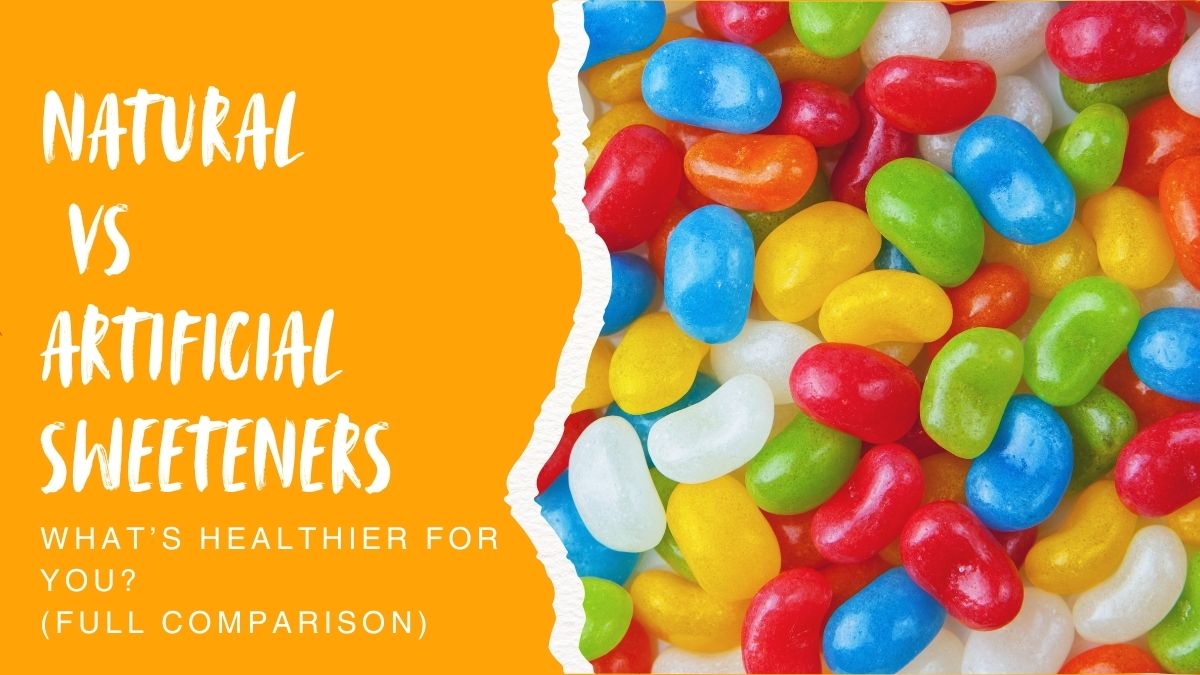In today’s world of health-conscious choices, sweeteners have become a hot topic. Whether you’re trying to cut sugar, lose weight, or manage blood sugar levels, you’ve probably considered options like Stevia, Sucralose, Aspartame, or even Maple Syrup.
But which sweetener is really better for you? Let’s break it down — based on the latest scientific research and regulatory guidance.
Table of Contents
Natural vs Artificial Sweeteners: Quick Overview
| Sweetener | Type | Calories | Glycemic Impact | Taste Profile |
|---|---|---|---|---|
| Stevia | Natural | 0 | Very Low | Sweet, slight herbal note |
| Maple Syrup | Natural | High | High | Rich, caramelized sugar |
| Sucralose | Artificial | 0 | None | Very sweet, clean taste |
| Aspartame | Artificial | 0 | None | Sweet, mild aftertaste |
What Are Natural Sweeteners?
Natural sweeteners are derived from plants or natural sources. Two popular ones include:
1. Stevia
Stevia comes from the Stevia rebaudiana plant. Purified steviol glycosides are 200–300 times sweeter than sugar yet contain zero calories.
According to the FDA, high-purity stevia extracts are generally recognized as safe (GRAS) for use in foods.
🧠 Health Impact:
- Does not spike blood sugar.
- May slightly lower blood pressure and blood glucose (study link).
- Mild bitter aftertaste (depending on the type of stevia used).
2. Maple Syrup
Real maple syrup is tapped from sugar maple trees. Unlike refined sugar, it contains natural antioxidants and trace minerals like zinc and manganese.
🧠 Health Impact:
- High in sugar (~67% sucrose) and calories (~52 calories per tablespoon).
- Antioxidant properties may slightly benefit inflammation (source).
- Raises blood sugar similarly to regular sugar.
🌟 Bottom line: While maple syrup offers some nutrients, it’s still a high-sugar product and should be used in moderation, according to the World Health Organization’s guidelines.
What Are Artificial Sweeteners?
Artificial sweeteners are chemically synthesized to mimic sugar’s taste without the calories. Leading options include:
1. Aspartame
Aspartame is around 200 times sweeter than table sugar. It’s one of the most heavily studied food ingredients ever.
🧠 Health Impact:
- Approved safe by the FDA and EFSA.
- Safe daily limit: 50 mg/kg body weight (FDA Source).
- Note: People with phenylketonuria (PKU) must avoid it.
🔎 Recent updates: The WHO’s cancer research agency (IARC) recently labeled aspartame as “possibly carcinogenic,” but the FDA disagrees, citing insufficient evidence to change its safety status (FDA clarification).
2. Sucralose (Splenda)
Sucralose is around 600 times sweeter than sugar. It’s heat-stable, making it popular in baking.
🧠 Health Impact:
- Approved by FDA with an acceptable daily intake (ADI) of 5 mg/kg body weight (source).
- No calories and no impact on blood sugar.
- Emerging studies suggest high doses might affect gut bacteria (NIH study), but regular use is considered safe.
🌟 Bottom line: Artificial sweeteners help reduce calorie intake but long-term benefits (like sustained weight loss) remain controversial, as noted by a recent WHO advisory.
Taste Comparison: What Should You Expect?
- Stevia: Very sweet, but can have a licorice or herbal aftertaste.
- Maple Syrup: Smooth, rich, caramel-like flavor — very close to natural sugar.
- Sucralose: Clean sweetness, similar to sugar.
- Aspartame: Sweet and mild, slightly different mouthfeel than sugar.
👉 Tip: Blended sweeteners (like stevia + erythritol) can taste more like sugar without aftertaste issues.
Are Sweeteners Safe? Here’s What Authorities Say
| Sweetener | Safety Status | Authority | Notes |
|---|---|---|---|
| Stevia | GRAS | FDA, JECFA | Safe within daily limits (FDA link) |
| Maple Syrup | Generally safe | WHO Dietary Advice | Limit due to high sugar content (WHO Guidelines) |
| Aspartame | Approved | FDA, EFSA | Safe under 50 mg/kg/day, caution for PKU patients |
| Sucralose | Approved | FDA, EFSA | Safe under 5 mg/kg/day, possible gut impact at high doses |
Final Thoughts: Which Sweetener Should You Choose?
Choosing the right sweetener depends on your goals:
- Want zero calories and minimal blood sugar impact? Go for stevia, sucralose, or aspartame — but stay within safe limits.
- Prefer a natural product with real flavor? Maple syrup is delicious, but treat it like a luxury, not an everyday staple.
- Worried about long-term health? Moderation is key. Even “zero-calorie” sweeteners should be used thoughtfully, not excessively.
⚡ Pro tip: Check labels! Many “sugar-free” products mix several sweeteners — knowing what’s inside can help you make better health choices.
References:
- FDA: About High-Intensity Sweeteners
- WHO Guidelines on Sugars
- NIH Study: Sweeteners and Gut Health
- FDA Statement on Aspartame Safety
- Maple Syrup Antioxidant Properties
- Stevia and Diabetes Research
- Heart Age Calculator - August 12, 2025
- Home Workout Estimator - July 29, 2025
- Plant-Based Macro Calculator - July 29, 2025

